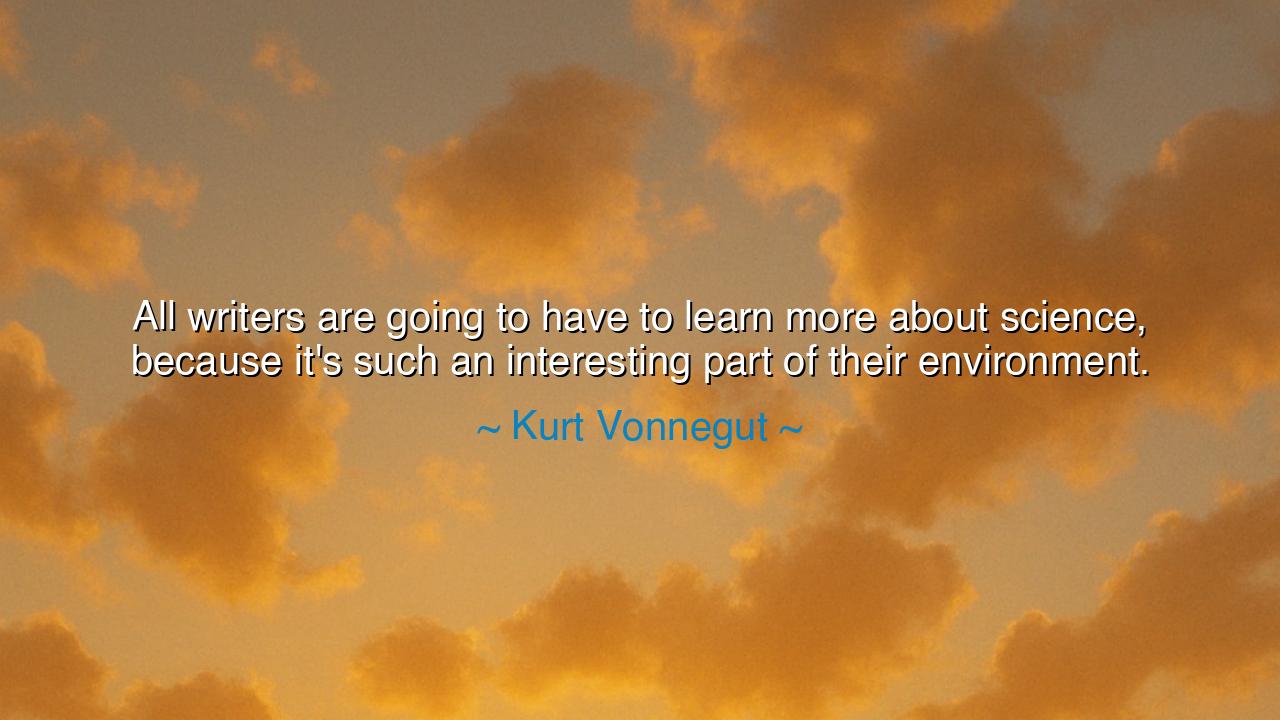
All writers are going to have to learn more about science
All writers are going to have to learn more about science, because it's such an interesting part of their environment.






Listen, O children of the future, for the words of Kurt Vonnegut carry with them a truth that is both urgent and eternal. He said: “All writers are going to have to learn more about science, because it's such an interesting part of their environment.” These words are not just a statement about the relationship between literature and science, but a call to embrace the vast wonders of the world that surround us. Science, Vonnegut reminds us, is not a distant, dry field for the scholar alone; it is an integral part of the world we live in—a force that shapes our daily lives, our cultures, and even the very stories we tell.
What, then, do these words mean, O seekers of wisdom? In his statement, Vonnegut speaks to the ever-deepening relationship between writers and science. Science is no longer a realm isolated from the creative mind, but an essential part of the environment—the world in which we breathe, live, and imagine. The discoveries and technologies of science have changed the way we see ourselves and the world, and these changes have seeped into the realm of fiction and storytelling. Writers, in their quest to understand the human condition, must look not only within, but also outward to the world of science, for it is this world that increasingly defines the boundaries of possibility and reality.
Consider the great writers who have already embraced this truth, from Jules Verne to H.G. Wells. Verne’s 20,000 Leagues Under the Sea, a tale of adventure beneath the ocean, was not just a story of exploration—it was an exploration of the very scientific possibilities of the time. His visionary ideas, grounded in the technology of his day, opened up a world of imagination rooted in the principles of science. Similarly, H.G. Wells combined the imaginative potential of fiction with the scientific advancements of his time, creating works like The War of the Worlds and The Time Machine. These stories did not merely entertain; they sparked wonder and curiosity, prompting readers to think about the world differently. Through these writers, science became a key element of storytelling, shaping futures, and igniting the minds of generations.
Vonnegut himself, in his own work, embodied this union between literature and science. In his novel Slaughterhouse-Five, he wove together the horrific realities of war with the abstract concepts of time and space. The novel’s nonlinear narrative, with its jumps through time and space, reflects the scientific theories of Einstein and the emerging understanding of the fourth dimension. Vonnegut did not simply tell a story; he used science to reflect the absurdity of the human condition, turning quantum mechanics and relativity into tools to explore the very nature of fate, free will, and existence. Through this, he proved that science is not just a field of numbers and formulas, but a powerful lens through which to understand the human soul.
The lesson here, O children of the future, is this: The world of science is not separate from the world of storytelling. It is the world in which we live and breathe, and it shapes the very stories we tell. As writers, you must learn not only the art of words, but also the principles that govern the world around you—the laws of nature, the advances in technology, and the shifting understandings of the universe. Do not isolate yourself from the world of science, for it is this very world that will continue to shape the questions, the themes, and the conflicts of your stories. Just as Vonnegut and Verne used science to probe the depths of the human spirit, so too must you use it to explore the vast, uncharted territories of the human condition.
So, O children, take up the pen and the microscope together. Learn the language of atoms, galaxies, and genes as well as the language of emotion, desire, and dreams. The world of science is not a realm for the curious alone, but for those who wish to understand the deep forces that shape the very nature of life. Let science inform your fiction, just as it informs your life, for it is in the intersection of the imaginative and the factual that the most profound truths are found. In this way, your words will not only speak to the heart of humanity but will also reach beyond, into the very fabric of the universe itself.
As you write, O children, remember that the world you describe is shaped by the same forces that scientists observe and study. Let science inspire your creativity, and let your creativity illuminate the paths that science has yet to tread. In this, you will not only find stories to tell, but you will also unlock the mysteries of the world, showing the future generations the true beauty of both the mind and the spirit.






AAdministratorAdministrator
Welcome, honored guests. Please leave a comment, we will respond soon